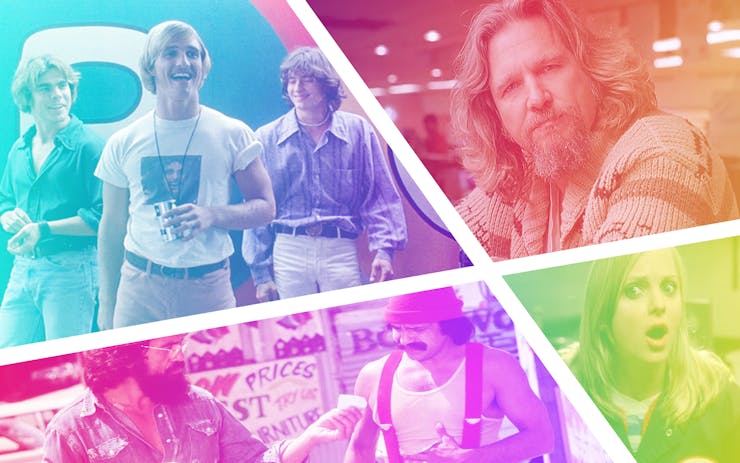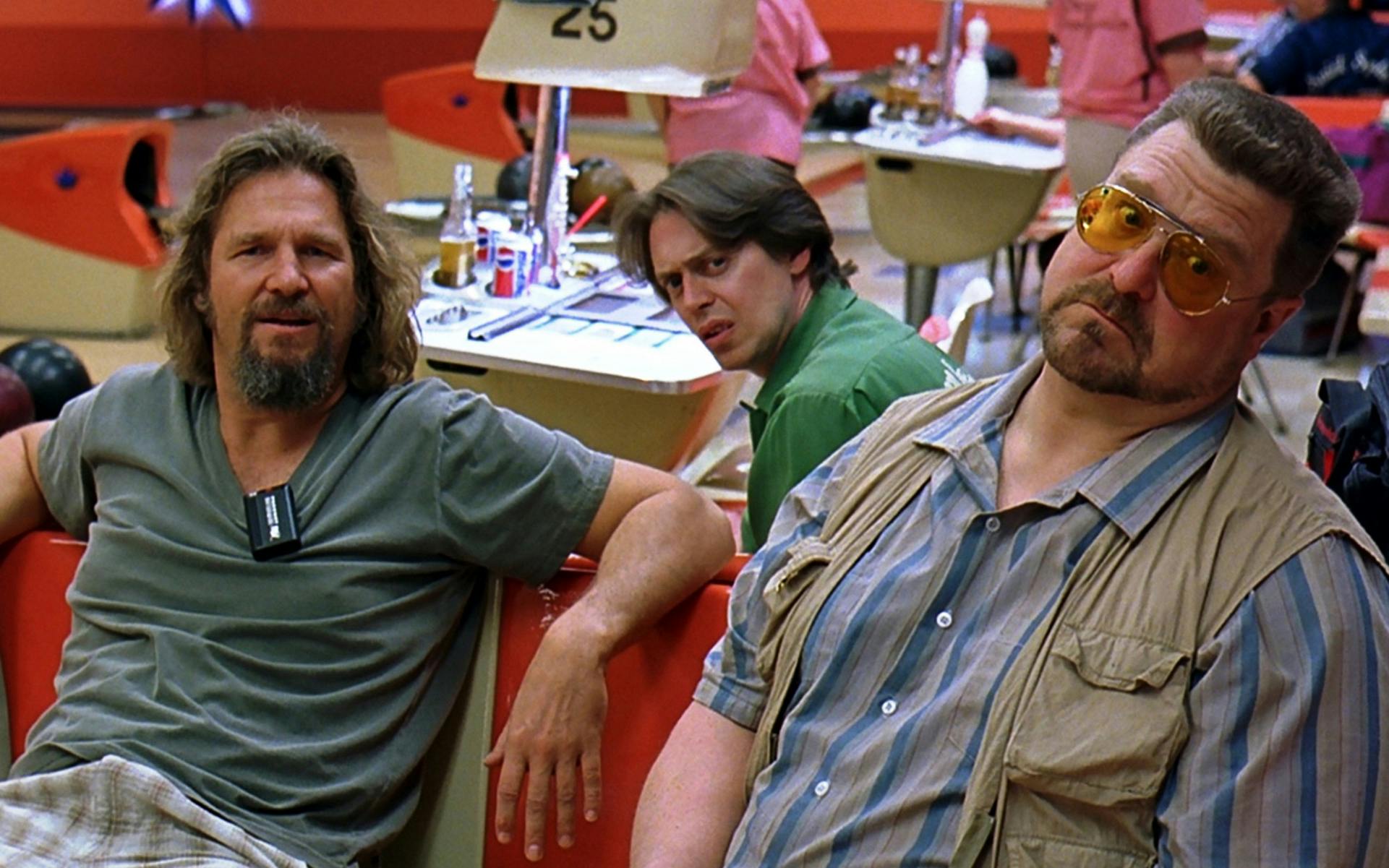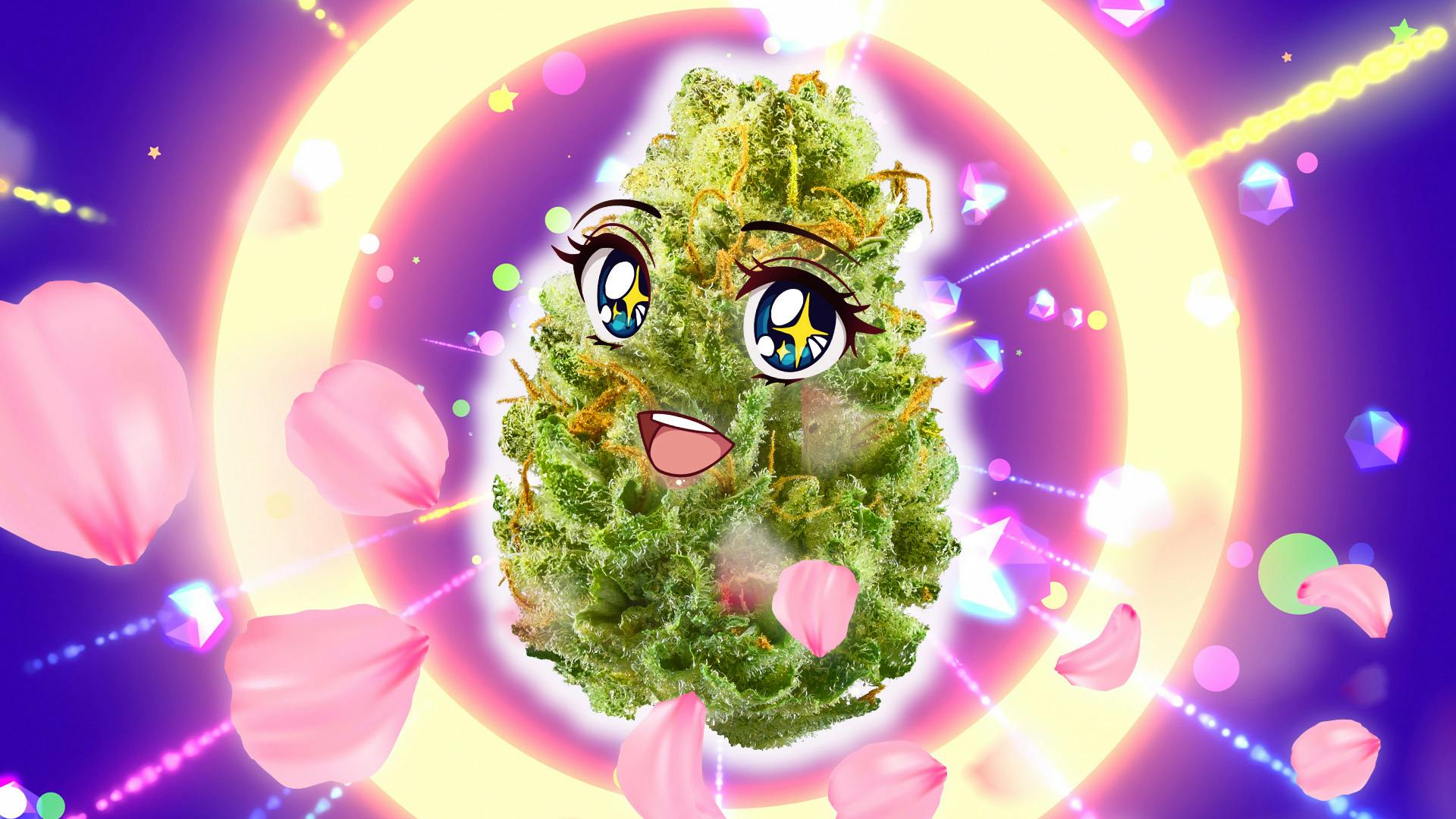Find out which stoner movies had the biggest impact on American culture in the 1900s and early 2000s.
This isn’t a list of the best movies to watch while you’re stoned, or even the best movies about people getting stoned—although every one of these films would belong on at least one of those lists, and several would belong on both. Instead, these are movies that in some way proved game-changing through cultural impact.
To burn through the most obvious example, Reefer Madness (1936) is actually terrible on every level. Not only is the infamous marijuana morality play’s description of cannabis as an “unspeakable scourge” laughably wrong, but the story itself is also way too long, incredibly boring, and endlessly repetitive, with wooden acting and barely passable production values.
But put all that aside and think of how useful the phrase “reefer madness” has become in pointing out the propensity of cannabis prohibitionists to propagate stories about the plant’s supposed harms so outlandish and illogical that we’ve literally been using the name of this super old movie like a meme since the 1970s to ridicule such nonsense.
And that’s not all—Reefer Madness also helped launch one of Hollywood’s largest production companies and kickstarted the nation’s earliest cannabis legalization organization.
All of these milestones make the oldest film on our list a definite game changer, one that was released less than 10 years after the first “talkie” ended the silent movie era in Hollywood and a full year before the Marijuana Tax Act of 1937 made cannabis federally illegal for the first time.
So what better place to begin our selective filmography of culture-shifting stoner flicks? Just to prove this list doesn’t take itself too seriously, here’s a recipe for cannabutter to put on your popcorn.
Reefer Madness (1936)

The movie best known as Reefer Madness has had three very distinct lives and at least as many titles.
Shop highly rated dispensaries near you
Showing you dispensaries nearFirst financed by a church group in Texas and called Tell Your Children, it was originally conceived as a straightforward plea to parents, all but begging them to put the fear of God into their kids when it comes to the Devil’s Lettuce.
But not long after a lackluster release, the film’s rights fell into the hands of notorious B-movie director Dwain Esper, who promptly re-cut the original footage to heavily emphasize sex, drugs, violence, and other cheap thrills. At the time, Hollywood had just implemented its infamous “production code,” which strictly limited the subjects major movie studios could depict in their films. But Esper—a lifelong small-time independent operator—suffered under no such restrictions.
So like many others on the “exploitation circuit,” he specialized in stories that claimed to educate the masses about the terrible price to be paid for indulging in a vice while stealthily giving audiences a cultural license to see all of their naughty desires indulged in from the safety of a cinema seat.
The story of a (gasp!) unmarried couple who sells loose joints to local teenagers, then veers heavily to melodrama as everyone who smokes cannabis in the movie commits crimes, dies, goes insane, or potentially all three before the story ends with some heavy moralizing. But make no mistake, the crowds that came didn’t show up for the lecture, they came to be titillated and experience taboo.
The only problem was, nobody really liked it, and so an already obscure film soon fell completely off the map.
Until 1971, when Keith Stroup, founder of the National Organization for the Reform of Marijuana Laws (NORML), discovered a copy languishing in the Library of Congress. After paying $297 for a print of the film (which had fallen into the public domain), he screened it as part of a NORML legalization fundraiser, and for perhaps the first time ever, a movie was enjoyed ironically, to the tune of much derisive laughter.
Eventually, New Line Cinema founder Robert Shaye decided to put Reefer Madness out on the midnight movie circuit, paired with Martian Space, a half-hour sci-fi comedy. The implication that you were expected to arrive for this double-bill really stoned or perhaps get stoned in the theater (hey, it was the 70s) couldn’t have been stronger.
And at long last, the film was a hit, with the profits giving a huge early boost to an upstart production company that later brought you the Lord of the Rings trilogy.
Easy Rider (1969)

In many ways, Easy Rider was a bridge from the old exploitation circuit that spawned Reefer Madness to the incredible explosion of independent cinema that shook up Hollywood in the 1970s.
After all, “motorcycle pictures” had already been in heavy rotation for a few years by the time Peter Fonda and Dennis Hopper roared onto the silver screen aboard growling choppers, and from a distance, the film appeared to be yet another small-budget take on a familiar genre. Fonda had already played a biker in 1967’s The Wild Angels, and nobody expected anything much different or better than that forgettable film. But then the times and the talent combined to catch lightning in a bottle.
To this day, the legendary campfire scene—where Fonda and Hopper get a young, alcoholic ACLU lawyer (played by Jack Nicholson) stoned for the first time—stands among the most famous in American movie history.
As assurances that cannabis is not addictive and a quick debunking of the gateway theory quickly give way to a heady late-night discussion of aliens from Venus plotting to take over the planet, keep in mind that all three actors are smoking real cannabis on screen.
The Harder They Come (1972)

The first film ever made with an entirely Jamaican cast and crew, The Harder They Come stars Jimmy Cliff and has an incredible soundtrack that brought reggae music to a worldwide audience years before Bob Marley became an international sensation. Cliff plays a poor country boy who comes to the city and gets pulled first into the cut-throat (literally) music business of the era, then into the island’s thriving illegal ganja trade.
While there’s plenty of action and gunplay throughout, the film also takes a highly critical look at who benefits from the prohibition of cannabis, and who suffers the consequences.
Up in Smoke (1978)
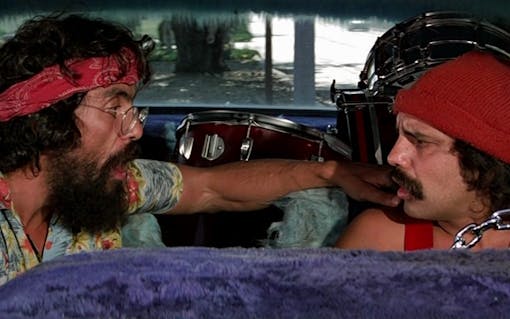
Upon its release 40 years ago, The Hollywood Reporter praised Cheech Marin and Tommy Chong’s first feature as “the most amusing pot movie since Reefer Madness.”
More importantly—at least for the future of stoner cinema—a film the same review summarized as “a day in the life of two spaced-out freaks as they set out to score some weed” became a massive hit. Made for under a million dollars, it earned $44 million at the domestic box office and spawned a mini-franchise of spiritual sequels featuring the ultimate, all-time stoner buddy comedy team.
Cheech and Chong had developed their characters over the course of a decade, in small clubs and on comedy albums, before getting their big break in the movies. By proving that a stoner comedy starring people of color could yield huge profits, they changed the game in more ways than one, and it’s never been the same since.
Up in Smoke also delivers the duo’s iconic “You mean we’re smoking dog shit, man?” scene. And by the way, don’t smoke weed while you’re behind the wheel—also, here’s some science about stoned driving.
Dazed and Confused (1993)

What accounts for the 15-year gap from Up in Smoke to Dazed and Confused?
Go ask somebody who lived through the Reagan/Bush years of “Just Say No,” when television and the movies were full of anti-cannabis programming only slightly more nuanced than Reefer Madness. Ronald Reagan had himself been an actor, and once served as president of the Screen Actor’s Guild, before turning to politics, so he uniquely understood the power of Hollywood to shape public opinion
So, while Cheech and Chong (who already had a built in audience) managed to put out a few movies in the 1980s, the entire genre lay dormant until the political winds changed.
Now, make no mistake, when Bill Clinton was elected in 1992, the War on Marijuana continued largely unabated, at least in terms of arrests. But culturally the taboo around cannabis noticeably lessened. So much so, that a year into the new administration, Gramercy Pictures released a wonderful little film depicting a day in the life of a bunch of pot-smoking high school students and their beer swilling friends.
More than just heralding the return of stoner movies, however, Dazed and Confused truly elevated the genre. Throughout the film, cannabis is not just passed around and smoked, it’s a literal rite of passage, and also a metaphor for the liberty of the individual in the face of illegitimate authority. As in this wonderful scene, where a small Texas town’s friendly neighborhood herb dealer suggests turning the local high school’s “loyalty pledge” for student athletes into a political statement by throwing a little grass right in the middle.
“Roll it up and sign the joint man—that’s gonna tell them something.”
Damn right it will.
Friday (1995)

Ice Cube both wrote and starred in Friday, a film that stemmed from his frustration that nearly every portrayal of “the hood” in movies focused on violence and law breaking. At the time, Ice Cube himself was best known as a founding member of NWA, which popularized gangsta rap in the late 1980s—so his move to comedy seemed risky to say the least. But in his own words, “damn near all” of the movie is autobiographical or about people he knew growing up in South Central Los Angeles, and so he pushed hard to make this very personal story a reality.
With no studio willing to finance the film, good old New Line Cinema (see Reefer Madness above) stepped up to bring the tale of two best buds who get in over their heads with a local weed dealer to the big screen.
“They was doing movies like Boyz N the Hood, which I did, Menace II Society, South Central, and even Colors, going back that far,” Ice Cube explained to Complex on the occasion of Friday’s 20th anniversary. “Everybody was looking at our neighborhood like it was hell on Earth, the worst place you can grow up in America. And I’m like, Why? I didn’t see it all that way. I mean, I knew it was crazy around where I grew up, but we had fun in the hood. We used to trip off the neighborhood. I was a fan of Cheech and Chong movies… we watched them all the time. We’d be in the studio laughing all day, smoking weed, and we were just like, ‘Yo, we need to create something to show how the hood really is, from our vantage point.’ That’s how it started,” said Cube.
The Big Lebowski (1998)
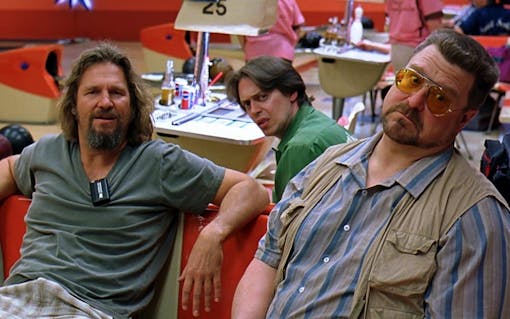
It’s not a stoner movie, it’s an incredibly brilliant and hilarious movie about a guy who happens to smoke a lot of cannabis. Yes, that’s a fine line, but I’ve got to draw it somewhere. Anyway, here’s a fun fact: The scene where The Dude drops a joint in his lap, tries to put it out with a beer, and crashes his car is an homage to the final scene in Up in Smoke.
Harold and Kumar Go to White Castle (2004)

Ironically for a movie focused on fast food, everything about Harold and Kumar felt fresh when it came out, from the idea of a stoner buddy comedy about two really smart dudes to the fact that the movie had two Asian Americans in the lead roles.
The writing was also free of tired old tropes and cringeworthy stoner stereotypes. In fact, the only truly stereotypical characters in the film, and the only recognizable villains besides the cops, are a bunch of “extreme” bros whose chummy racism is sharply dismissed as stupid and outmoded.
Plus, come on, there’s the scene where Kumar (Kal Penn) makes loves to a giant bag of weed!
Smiley Face (2007)

The story of an out-of-work actress who unknowingly ingests an entire tray of cannabis-infused cupcakes, Smiley Face opened on a single screen and ended its theatrical run with a domestic box office gross of just $9,397. Even today, the film’s pretty tough to find, and that’s saying something in a world where an actual cannabis cupcake is only a mouse click away.
Anyway, let’s start with the obvious—in 9 to 5 (1980), Jane Fonda, Dolly Parton and Lily Tomlin cook up an elaborate revenge fantasy against their evil boss while passing around a fat doobie, an incredible scene that was most likely the first time a bunch of ladies had a good time getting stoned together in a major motion picture.
But it would take another 25+ years for Anna Farris to make her star turn in Smiley Face, giving the world its first and only female-fronted stoner comedy. A distinction that remained largely intact until this year’s release of the Netflix original movie Dude, about four female high school friends struggling to make a smoky transition into “the real world.”
Beyond all that female empowerment, however, and despite its tepid response at the box office, Smiley Face is an incredibly weird, compelling, and cerebral take on cannabis that includes an original manuscript of the Communist Manifesto among its major plot points. So, if the cancellation of Broad City has you yearning for more female-focused stoner comedy, why not head up the river of influence to find this obscure but influential film that’s still capable of turning heads a decade after its release.
